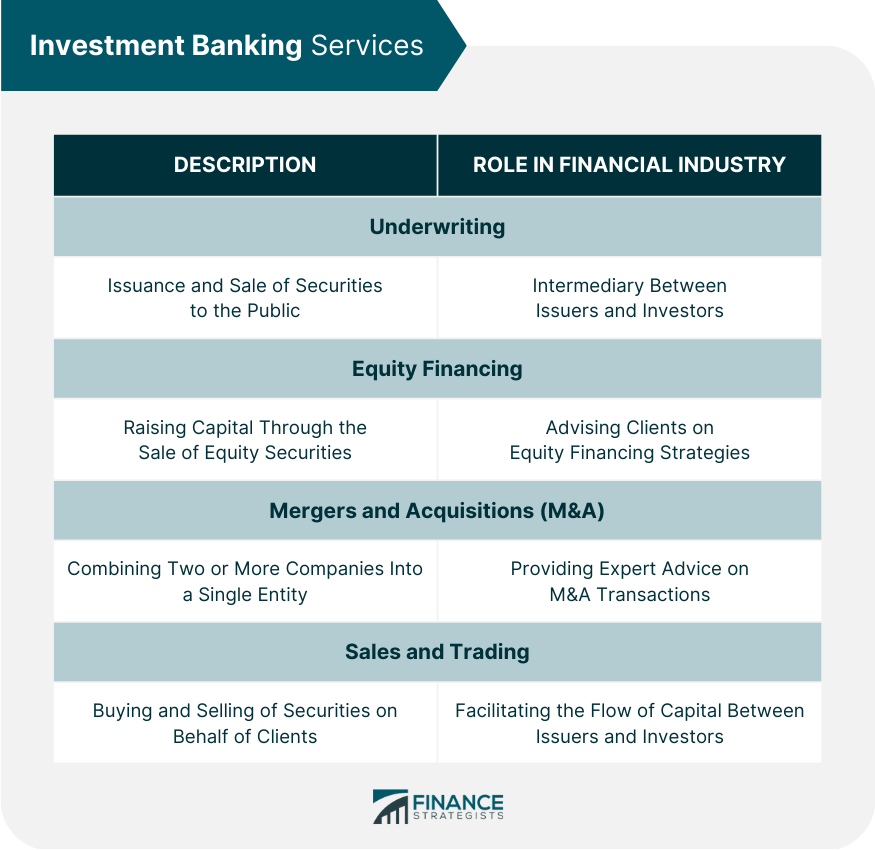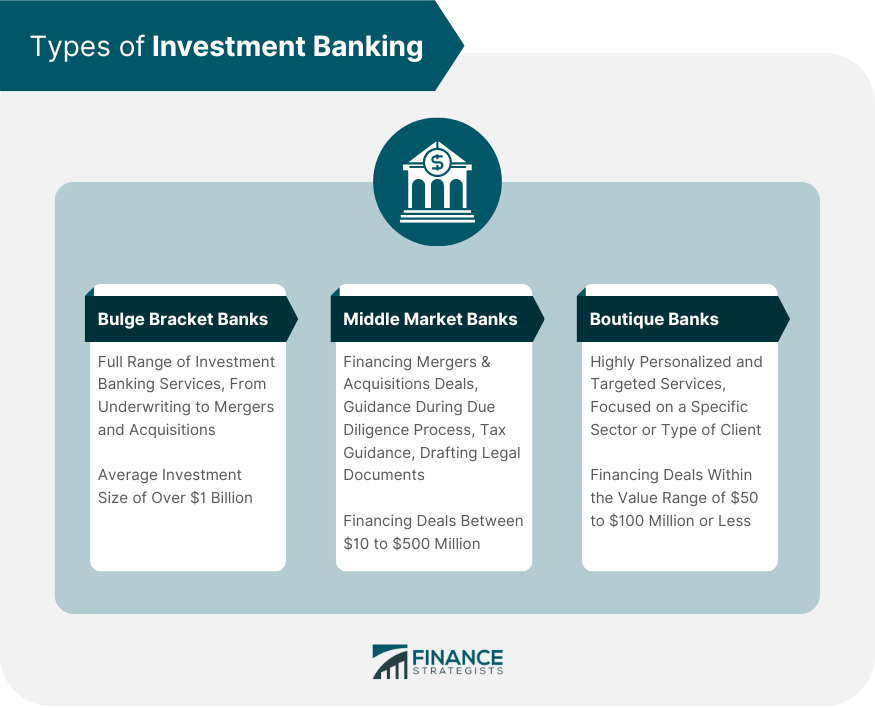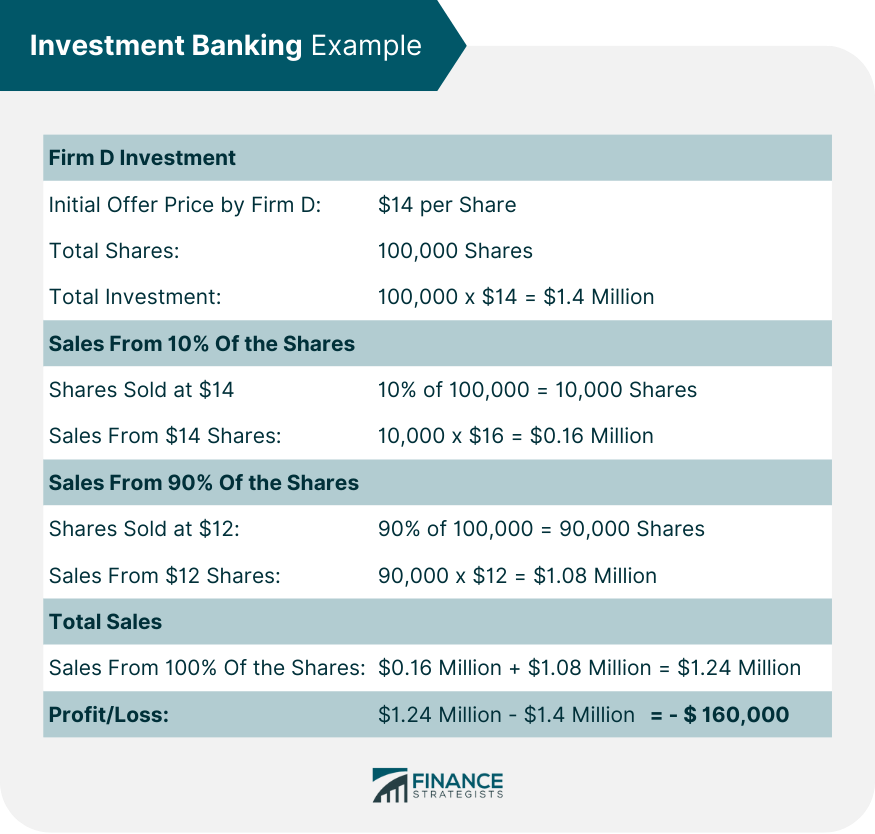Investment banking is a financial service that helps corporations, governments, and institutional investors raise capital. Investment bankers advise on investments, mergers and acquisitions (M&A), and corporate restructuring. They underwrite new equity and debt securities for their clients, provide asset management, and assist companies in expanding through an initial public offering (IPO). Investment bankers advise corporations on various strategies related to equity financing, derivative products, and mutual fund investing. They may also assist governments in creating and managing sovereign wealth funds and provide strategic advice on privatization issues. Investment banking is a highly regulated industry that requires investment bankers to adhere to strict ethical standards and regulations. This ensures that the interests of both issuers and investors are protected and that the investment banking industry operates with transparency. Investment banks offer financial services to clients in the private and public sectors. Fees are typically charged for M&A advice, underwriting, and capital market access. When trading stocks, bonds, or derivatives on behalf of a client, commissions, and income are frequently earned. Underwriting offers capital to corporations or governments in exchange for ownership of shares or bonds. When a company wants to go public, it requires the assistance of an investment bank that can provide expert advice on the pricing and structure of its securities offering. Governments often raise capital by selling debt as bonds to private entities. Investment banks serve as advisors and intermediaries, helping to manage the sale of debt through the issuance of bonds. Equity financing is raising capital through selling equity securities, such as stocks. Investment banks provide advice to clients on the selection of an applicable stock exchange, the pricing of shares, and the timing of an initial public offering. Investment banks may also offer comprehensive research services, including fundamental and technical analysis, market research, industry analysis, financial projections, macroeconomic trends, sector outlooks, and company-specific reports. Mergers and Acquisitions combine two or more companies into a single entity. Investment banks provide expert advice to clients on M&A transactions, including negotiations, due diligence, and the preparation of legal documents. Through M&A transactions, both companies benefit from cost savings of sharing resources or increased market share from entering new geographic regions, leading to growth opportunities. Sales and trading refer to the buying and selling securities on behalf of clients. Investment banks provide a wide range of sales and trading services, including market making, trading in derivatives, and executing large trades for institutional clients. When trading for their accounts, these investment banks act as principals who assume risk to earn profits instead of relying on a purely commission-based income model. Firms employ risk management techniques to protect themselves under volatile market conditions. Investment banking is a diverse and dynamic industry, and investment banks can be grouped into three main categories: These banks are the largest and most well-established investment banks in the world. They are typically global in scope and deal with an average investment size of over $1 billion. They offer a full range of investment banking services, from underwriting to mergers and acquisitions. These banks have a strong reputation and a broad network of clients. They often work with large corporations and governments, focusing on large-scale assignments such as public offerings and spinoffs. They usually have deep pockets to finance these transactions. The term bulge bracket refers to a group of prominent global investment banks, including Bank of America Merrill Lynch, Goldman Sachs, and Barclays Capital.. The next category of investment banks serves smaller clients than bulge bracket firms. These clients often fall into the mid-sized category making them too big for regional boutiques but not quite big enough for bulge bracket deals. Middle market banks specialize in financing mergers & acquisitions deals such as private equity or management buyouts between $10 to $500 million in size. They also guide the due diligence process, providing tax guidance and drafting legal documents. Robert W. Baird, Piper Jaffray & Co, and Houlihan Lokey are some of the most prominent middle-market investment banks. Boutique banks are smaller than the middle market and bulge banks. These specialized investment banks focus on a specific sector or type of client. They are often more nimble and responsive to the needs of their clients, and they may offer more customized services. They do not require the same resources or power wielded by the larger bulge bracket firms can offer. They typically deal within the value range of $50 to $100 million or less. Lazard Ltd., Evercore Inc., and PJT Partners Inc. are among the largest boutique banking firms in the U.S. in terms of market capitalization. Suppose Company X is a tech start-up that develops artificial intelligence software for customer service. The company wants to go public and raise capital for growth. Investment banking Firm C offers to manage the IPO for $10 per share. However, investment banking Firm D offers a higher price of $14 per share for managing the IPO. Company X chose Firm D based on its higher offer, raising $1.4 million by selling 100,000 shares. After completing the IPO process, Firm D sells the shares for $16 each. Unfortunately, due to market conditions and low demand, Firm D can only sell 10% of the shares at this price. Consequently, Firm D is forced to lower the price to $12 to sell the remaining 90,000 shares. Therefore, Firm D suffered a loss of $160,000 in the IPO deal for Company X. The company's overvaluation by Firm D resulted in the loss. The investment banking industry is subject to a vast array of regulations to ensure financial markets' stability, transparency, and fairness. The Securities and Exchange Commission (SEC) regulates nearly every aspect of investment banking. Licensing, compensation, reporting, filing, accounting, advertising, product offerings, and fiduciary responsibilities are all included. The Glass-Steagall Act is one of the most notable regulations that have impacted the investment banking industry. The Glass-Steagall Act was enacted in the United States in 1933 in response to the stock market crash of 1929 and the subsequent Great Depression. The act separated commercial banking activities from investment banking activities, effectively preventing commercial banks from engaging in securities underwriting and other investment banking activities. In addition to the Glass-Steagall Act, investment banks are subject to several other regulations. The Sarbanes-Oxley Act of 2002 was enacted in response to the accounting scandals of the early 2000s. It expanded requirements for public companies and firms. The Dodd-Frank Wall Street Reform and Consumer Protection Act of 2010 was enacted in response to the financial crisis of 2008 and aimed at increasing regulatory oversight of financial markets, including investment banking. These regulations play a crucial role in ensuring the stability and integrity of the financial system. Regulators can protect investors from unscrupulous practices and provide a level playing field for all market participants. Investment banking plays a vital role in the financial industry by facilitating the flow of capital between issuers and investors and providing expert advice and guidance to clients on various financial transactions. Investment banks offer financial services to clients in the private and public sectors. These services include underwriting, equity financing, mergers and acquisitions, and sales and trading. The type of investment bank clients choose will depend on their specific needs and goals. Bulge bracket banks offer a broad range of services and a global network of clients. Middle market banks provide a more personalized and specialized approach to investment banking. Boutique banks offer a highly focused and customized service for specific types of clients. Understanding the main differences between these types of banks is crucial in deciding which type is most suitable for your company’s undertaking. The regulations that govern investment banks are essential in maintaining the stability and reliability of the financial system, promoting transparency and fairness in the markets. They safeguard investors from unethical behavior and provide a fair environment. Depending on your location and service requirements, you have several banking options. Consider contacting one.What Is Investment Banking?
Investment Banking Services
Underwriting
Equity Financing
Mergers and Acquisitions (M&A)
Sales and Trading

Types of Investment Banking
Bulge Bracket Banks
Middle Market Banks
Boutique Banks

Example of Investment Banking

Investment Banking Regulations
Final Thoughts
Investment Banking FAQs
One of the primary sources of income for investment banks is fees charged for providing services such as mergers and acquisitions advice, underwriting, and access to capital markets. Investment banks also earn commissions when they trade stocks, bonds, or derivatives on behalf of their clients. Additionally, they generate income through asset management and the sale of securities.
The role of investment bankers is to offer a range of financial services, including investment advice, M&A, corporate reorganization, underwriting new securities, asset management, and IPO support, as well as strategic advice on equity financing, derivative products, mutual fund investing, and privatization. Additionally, investment bankers may assist governments in creating and managing sovereign wealth funds and providing advice on privatization matters.
The typical clients of investment banking are corporations, governments, and institutional investors.
Investment banking is a lucrative career preference for those looking for a challenging and dynamic career in the financial industry. The high earning potential and professional development and growth opportunities are significant draws. Working in investment banking is also prestigious and well-regarded in the financial community.
Investment banks facilitate the flow of capital between issuers and investors by providing expert advice and guidance on various financial transactions. These include underwriting, mergers and acquisitions, equity financing, sales and trading, asset management, and other related services. Investment banks also advise governments on privatization matters or the creation and management of sovereign wealth funds.
True Tamplin is a published author, public speaker, CEO of UpDigital, and founder of Finance Strategists.
True is a Certified Educator in Personal Finance (CEPF®), author of The Handy Financial Ratios Guide, a member of the Society for Advancing Business Editing and Writing, contributes to his financial education site, Finance Strategists, and has spoken to various financial communities such as the CFA Institute, as well as university students like his Alma mater, Biola University, where he received a bachelor of science in business and data analytics.
To learn more about True, visit his personal website or view his author profiles on Amazon, Nasdaq and Forbes.















